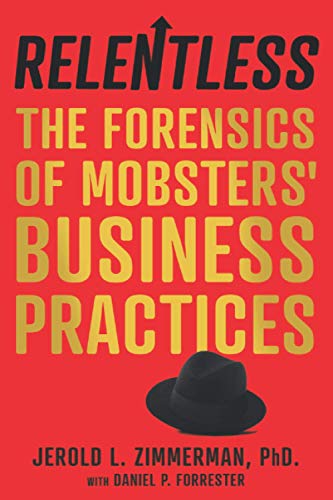
Since the start of the pandemic, federal and state lawmakers have dealt with questions about which mitigation programs to fund, how to do more with a lower tax base, and how to help those in need and encourage initiative and resilience. Most importantly, lawmakers have been asked to design national, state, and local systems to help test and then inoculate hundreds of millions of Americans through a massive inoculation effort. They face a divided country that often responds with a healthy dose of skepticism to government initiatives—and this is especially true of minorities.
After a decade of research, we believe that lawmakers should step back and study how mobsters take the long view and push decision-making at the local level; most importantly, they should examine how mobsters employ incentive schemes that motivate and contribute to America’s endless fascination with their very existence. Incentives matter a lot in defeating this pandemic, and lawmakers can take a masterclass about how the mobsters used incentives.
The five New York City Mafia family bosses certainly understood the enormous importance of incentives. These five families endured for over a century—despite billions of dollars of law enforcement opposition and ruthless rivals seeking to drive them out of existence. While iconic brands like Sears, Kodak, and Blockbuster slowly succumb to new rivals like Amazon and Netflix, the mafiosi had incentives to execute seamless transformations to reinvent themselves and thrive. In our book, Relentless: The Forensics of Mobsters’ Business Practices, we document how Mafia bosses used a variety of incentives to create high-performance crews of small groups of made men and associates linked to unique corporate cultures. Lawmakers would be wise to learn how the Mafia designed incentives to motivate and control their self-interested criminals.
Everyone, criminals and lawmakers alike, is self-interested. People care about more than just money. They value love, control, respect, independence, leisure, power, camaraderie, safety, service to others, fine wine or whiskey, consumables, and travel. Moreover, they make tradeoffs among their wants such as more leisure time for less income. People are also resourceful in finding ways to be better off. Some individuals circumvent the rules to get their COVID vaccines early, while others wait their turn so the people most in need are inoculated first. Both lawful and unlawful leaders must create incentives for workers to pursue their employer’s objectives rather than their own self-interests. The Mafia bosses understood this as well or better than most lawful leaders. For example, the Mafia invented the franchise business model long before McDonald’s designed its model.
Like a franchise owner who keeps most of the store’s profits and pays a small franchise fee based on the store’s revenue, a typical Mafia crew keeps 75 percent of its crime proceeds and passes the rest up to its captain and family boss. This creates strong incentives for the crew to find lucrative rackets—hijacking, gambling, loan sharking, extortion, and so forth. Besides the monetary incentives, the Mafia deployed strong non-monetary incentives. Snitching resulted in death. But it was equally important that formal admission into a Mafia family as a made man brought great prestige to one’s neighborhood, protection from other bad guys, and a microculture of respect and a sense of belonging. Associates would work diligently in hopes of becoming a made man. These strong incentives caused mafiosi to take the long view and shun short-termism. They forbade killing judges and prosecutors because this was bad for business when law enforcement retaliated. Becoming a made man could take years and even decades because of the time it took to vet associates’ criminal skills and loyalty.
To quell the natural self-interest of one family in seizing business from another family, thereby leading to interfamily wars, the five Mafia bosses created the “Commission.” Composed of the heads of the five families, the Commission had to sanction the killing of a made man in another family. Disobeying the Commission brought the wrath of the other four families, thereby creating strong incentives to conform. Adding new made men to a family required Commission approval. This prevented one family from enlisting more soldiers than the others, thereby reducing the incentives for inter family conflict.
Numerous examples exist of how the Mafia’s powerful incentives led to successful entrepreneurial activities that often exploited supply-and-demand mismatches linked to people’s vices:
-
A 1960 government study estimated the Mafia’s annual profits of $7 billion exceeded the combined earnings of the ten largest US corporations.
-
In 1925, twenty-eight-year-old Lucky Luciano bragged his annual bootlegging profits amounted to $58 million (in 2021 dollars).
-
One enterprising NYC mafioso operated forty sports-betting outlets that annually grossed over $300 million with profits of $45 million.
-
As New York State and New York City raised cigarette taxes to nearly $6 per pack, self-interested mafiosi smuggled butts from low-taxed states into the Big Apple. One study reports the state and city lost $1.6 billion annually because of untaxed sales. As New York lawmakers raised cigarette taxes, New York cigarette tax receipts declined as some quit and others bought smuggled smokes from Mafia suppliers.
The Interpol global police coordination agency understands the importance of incentives. It warned in December 2020 that organized crime networks could be targeting COVID-19 vaccines and could look to sell fake shots. Mobsters are relentless in pursuit of new schemes—especially when vaccines are the most precious product in the world during a global pandemic. Examples abound that emphasize the importance of incentives for lawmakers; sometimes lawmakers get it right and other times they are forced to face the consequences of poorly considered schemes.
Legislators who passed National Prohibition in 1920 vastly misunderstood the power of incentives. They thought they could eliminate drinking. Outlawing the manufacture and sale of alcohol had an unintended consequence: scarcity supercharged the American Mafia’s growth as self-interested mobsters entered the vacuum. Most Americans now sought a highly prized, but banned substance—alcohol. Overnight, prohibiting an entire legal industry created a new black market—the production and distribution of booze. With large profits from alcohol sales, mobsters corrupted local, self-interested law enforcement charged with policing the ban. Lawmakers realized the folly of Prohibition and repealed it ten years later.
Although Prohibition was a legislative failure to appreciate the power of incentives, there are examples of when lawmakers get it right just like the mafia so often do. For example, “Operation Warp Speed” cut years off the production of effective COVID-19 vaccines by providing powerful incentives for pharmaceutical companies to invest in unproven research regardless of market adoption. The critical incentive used by the federal government was the purchase of vast quantities of vaccines before their efficacy was proven. All the risk of failure was shifted to the federal government, which gave the drug companies the incentive to produce and test their vaccines.
Under the US Constitution’s underlying principle of federalism, all fifty states and territories have the responsibility to administer COVID-19 vaccines. Federalism creates incentives for state officials, starting with the governors, to run efficient immunization programs. Websites detail the percentage of doses delivered and administered, thereby providing voters in each state with a ready performance measure of their lawmakers and administrators. This performance measure coupled with the omnipresent election box motivates local officials to run efficient vaccination programs. Federalism will likely stimulate innovations in policy as state and local officials connect economic recovery with widespread immunizations. Incentives can play a major role if well thought out.
Some Americans believe the current vaccines are dangerous; others believe they don’t work; while still others are terrified of injections. Public relations campaigns often don’t work because they offer few incentives for people to get vaccinated. Some employees refuse the $30–$100 payment offered by their employers to get the jab. Some employers are offering days off or even Starbucks gift cards; but will they be enough?
To overcome the self-interest of vaccine-hesitant Americans and to achieve herd immunity, lawmakers must devise much stronger incentives to offset the fears of the people. For example, creating a digital, hard-to-counterfeit vaccination passport allowing the holder to travel, use public transportation, and attend concerts and sporting events would provide stronger incentives to get jabbed than a few dollars doled out by an employer. Given the precedent of the small country of New Zealand, which has overcome the virus, we can imagine local economies and lawmakers regulating vetted COVID-19-free tourist hot spots and cruises. These destinations will only welcome vaccinated, tested, and vetted American travelers. Pent-up leisure seekers with proven COVID-19 immunity and large wallets will pay higher prices for their scarce and safe vacations. Tax windfalls, economic recovery, and reelection parties will surely follow increased tourism. The Facebook postings and tweets of boasting travelers reveling with their friends will feed more demand for vaccinations.
Federalism might prompt some local lawmakers to link vaccination to lower property taxes. With many of the thousands of municipalities in the US starving to refill their coffers, don’t be surprised if some lawmakers follow one Israeli mayor’s example. The Mayor of Givatayim promised a “Discount on property taxes for families who have vaccinated persons over the age of sixteen by the end of the month . . . in order to give the families an incentive to get vaccinated.”
Unlike the Mafia families that create incentives for their members to take the long view, most lawmakers are incentivized to focus on their next reelection or one-year budget. They have little incentive to take the long view. Experts warned for years that another pandemic was coming and that most nations were ill-equipped with ventilators and personal protective gear. Building medical inventories and ICU capacity in case of another pandemic is a lower priority to self-interested lawmakers than (for example) increasing school spending next year. Some suggest that term limits on lawmakers will ease their short-term incentives. Others are dubious because most term-limited lawmakers find another government policy-making role after their terms expire. Violence and crime aside, mobsters can teach lawmakers that incentives matter a lot.
As this pandemic continues, we hope that lawmakers will consider incentives to encourage future preparedness, vaccine innovation, and population inoculation. Lessons from studying how mobsters used incentives would surely help the “good guys” running for office and seeking to enact more effective legislation.
______________________________________________________________________________________________________________________

Jerold L. Zimmerman, Ph.D.
Jerold L. Zimmerman, PhD, is a globally recognized microeconomist and author of seven books and has taught organizational economics, accounting, and finance at the University of Rochester’s Simon Business School for more than forty years. He has consulted with numerous clients, including Fortune 500 companies and management advisory firms, to demonstrate how organizational economics principles can improve a firm’s culture and, eventually, its performance. Zimmerman is also a founding editor of the Journal of Accounting and Economics, one of the most highly referenced peer-reviewed journals in economics, and has served on several public company boards of directors. His fifty published studies and books include textbooks on economics and accounting and a professional book about designing organizations that create value.

Daniel P. Forrester
Daniel P. Forrester is the founder of THRUUE, Inc, an expert consultancy that assists leaders in bridging the gap between corporate culture and corporate strategy. He works with CEOs, boards of directors, and C-suite leaders, helping them align around a clear strategy while understanding reputational and cultural risk. Daniel has spent the past twenty-five years successfully building consulting practices in the financial services, telecommunications, health, and public services sectors, utilizing his entrepreneurial approach to strategy. His previous book, Consider: Harnessing the Power of Reflective Thinking in Your Organization, examines how leaders responded to the explosion of data and hyper-connectivity impacting organizations and the role reflection can play in dramatically changing corporate outcomes.
______________________________________________________________________________________________________________________







